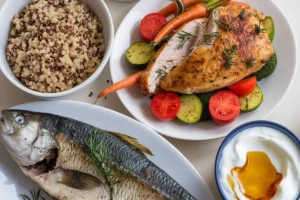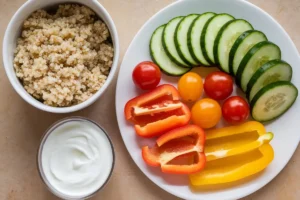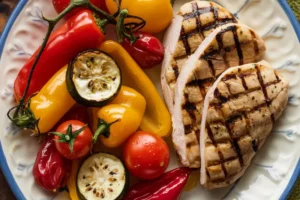Gastroesophageal reflux disease (GERD) is a common digestive disorder that occurs when stomach acid or bile irritates the lining of the food pipe. This can lead to a burning sensation in the chest, known as heartburn, and other uncomfortable symptoms. For those suffering from GERD, finding relief is a priority. One of the most effective ways to manage GERD symptoms is through diet. Certain foods can help soothe the digestive tract and reduce the frequency and intensity of symptoms.
Understanding GERD: The Basics
GERD is a chronic condition that can have a significant impact on quality of life. It occurs when the lower esophageal sphincter (LES), a ring of muscle between the esophagus and the stomach, weakens or relaxes inappropriately. This allows stomach acid to flow back up into the esophagus, leading to symptoms such as:
- Heartburn
- Regurgitation of food or sour liquid
- Difficulty swallowing
- Chronic cough
- Laryngitis
- Asthma
Understanding what triggers GERD is essential in managing it effectively. While medication can help, dietary changes are often necessary to reduce symptoms and prevent long-term complications.
How Diet Impacts GERD

The foods you eat can have a direct effect on the amount of acid your stomach produces. Certain foods can help protect the esophagus and reduce symptoms, while others can exacerbate GERD symptoms by increasing acid production or relaxing the LES. By making informed food choices, you can manage GERD more effectively and potentially reduce your reliance on medication.
Foods That Help GERD Go Away Fast
1. Oatmeal
Oatmeal is a whole grain that is rich in fiber, which is beneficial for digestive health. It can absorb stomach acid and reduce symptoms of GERD. Moreover, oatmeal doesn’t cause reflux, making it a safe breakfast option for those with GERD.
Tip: Add some bananas or apples to your oatmeal for added flavor and nutrition. Both fruits are low in acid and can help keep GERD symptoms at bay.
2. Ginger
Ginger has natural anti-inflammatory properties and is a well-known remedy for gastrointestinal issues. It can help reduce inflammation in the esophagus and soothe the digestive tract, making it a great option for those with GERD.
Tip: You can incorporate ginger into your diet by adding it to tea, smoothies, or even soups and stir-fries.
3. Aloe Vera
Aloe vera is another natural remedy that can help soothe the lining of the esophagus and reduce inflammation. It can also help neutralize stomach acid, providing quick relief from GERD symptoms.
Tip: Aloe vera juice is readily available in health stores. Make sure to choose a variety that is labeled for internal use, and consult with a healthcare provider before incorporating it into your routine.
4. Leafy Greens
Leafy greens like spinach, kale, and arugula are low in fat and acid, making them ideal for a GERD-friendly diet. They provide essential nutrients while being easy on the stomach.
Tip: Enjoy leafy greens in salads, smoothies, or as a side dish with your meals. Avoid dressing them with acidic dressings or high-fat toppings, which can trigger symptoms.
5. Bananas
Bananas are low in acid and high in pectin, a soluble fiber that helps food move smoothly through the digestive tract. They can help neutralize stomach acid and provide quick relief from GERD symptoms.
Tip: Enjoy bananas as a snack, in smoothies, or as a topping for oatmeal or yogurt. Their versatility makes them an easy addition to your diet.
6. Melons
Melons, such as cantaloupe, honeydew, and watermelon, are low-acid fruits that can help neutralize stomach acid. They are also high in water content, which can help dilute stomach acid and reduce symptoms.
Tip: Eat melon slices as a refreshing snack or add them to a fruit salad. Melons are especially soothing during warmer months when cold foods are more appealing.
7. Turkey and Chicken
Lean poultry, such as turkey and chicken, are low in fat and can help reduce GERD symptoms. High-fat foods are known to relax the LES, so choosing lean proteins can help prevent this.
Tip: Opt for grilled, baked, or broiled poultry instead of fried, as frying adds unnecessary fat that can exacerbate GERD.
8. Fish and Seafood
Fish and seafood are excellent sources of protein and omega-3 fatty acids, which have anti-inflammatory properties. Just like poultry, choose grilled or baked options to keep your meal GERD-friendly.
Tip: Fatty fish like salmon are particularly beneficial due to their high omega-3 content. Pair with steamed vegetables for a well-rounded, GERD-friendly meal.
9. Root Vegetables
Root vegetables like sweet potatoes, carrots, and beets are packed with fiber and essential nutrients while being low in acid. They can help reduce inflammation and soothe the digestive tract.
Tip: Roast root vegetables with a drizzle of olive oil and herbs for a delicious and satisfying side dish. Avoid adding acidic ingredients like vinegar or lemon juice.
10. Whole Grains
Whole grains like brown rice, quinoa, and whole wheat bread are high in fiber, which can help absorb stomach acid and reduce symptoms of GERD relief foods . They also provide sustained energy and are a healthy addition to any diet.
Tip: Replace refined grains with whole grains in your meals. For example, choose whole wheat bread over white bread, or brown rice instead of white rice.
Foods to Avoid for GERD Management

While certain foods can help manage GERD symptoms, others can trigger them. It’s important to be aware of these trigger foods and avoid them as much as possible.
1. Citrus Fruits
Citrus fruits like oranges, lemons, and grapefruits are high in acid and can irritate the esophagus, leading to increased symptoms. If you’re prone to GERD relief foods , it’s best to avoid these fruits or consume them in small amounts.
2. Tomatoes
Tomatoes and tomato-based products like sauces and soups are also acidic and can worsen GERD symptoms. Opt for non-tomato-based sauces, such as those made with olive oil and herbs, to reduce your symptoms.
3. Spicy Foods
Spicy foods can irritate the lining of the esophagus and trigger heartburn. If you enjoy spicy dishes, consider using milder spices and herbs that are less likely to cause discomfort.
4. Fatty Foods
High-fat foods, such as fried foods, fatty cuts of meat, and full-fat dairy products, can relax the LES and increase the risk of acid reflux. Choosing leaner options and cooking methods that use less fat can help manage symptoms.
5. Chocolate
Chocolate contains caffeine and other compounds that can relax the LES, making it easier for acid to escape from the stomach. For those with GERD relief foods , it’s best to limit or avoid chocolate consumption.
6. Caffeine
Caffeine, found in coffee, tea, and some sodas, can increase stomach acid production and relax the LES. Opt for decaffeinated versions or herbal teas that are less likely to trigger symptoms.
7. Alcohol
Alcohol can relax the LES and increase acid production, leading to GERD symptoms. If you choose to drink, do so in moderation and avoid drinking on an empty stomach.
8. Peppermint
While peppermint is often used to soothe digestive issues, it can relax the LES and trigger acid reflux in some people. If you’re prone to GERD, it’s best to avoid peppermint-flavored products.
How to Incorporate GERD-Friendly Foods into Your Diet
Incorporating GERD relief foods into your diet doesn’t have to be challenging. With a little creativity and planning, you can enjoy delicious meals that help manage your symptoms.
Breakfast Ideas
- Oatmeal with Banana and Almond Milk: Start your day with a warm bowl of oatmeal topped with sliced bananas and a splash of almond milk. This combination is filling and gentle on the stomach.
- Green Smoothie: Blend spinach, a frozen banana, ginger, and aloe vera juice for a refreshing smoothie that soothes the digestive tract.
Lunch Ideas
- Grilled Chicken Salad: Top a bed of leafy greens with grilled chicken, cucumber, and a light vinaigrette made with olive oil and herbs.
- Turkey and Avocado Sandwich: Use whole wheat bread, lean turkey slices, and avocado for a satisfying sandwich that won’t trigger GERD relief foods symptoms.
Dinner Ideas
- Baked Salmon with Sweet Potatoes: Bake salmon fillets with a drizzle of olive oil and herbs, and serve with roasted sweet potatoes and steamed broccoli.
- Quinoa and Vegetable Stir-Fry: Cook quinoa and stir-fry with a mix of your favorite root vegetables and a splash of low-sodium soy sauce.
Snack Ideas
- Almonds and Carrot Sticks: Almonds are a great source of protein and healthy fats, while carrot sticks provide crunch and fiber.
- Melon Slices: Enjoy a few slices of cantaloupe or honeydew melon for a sweet and refreshing snack.
Tips for Dining Out with GERD
Eating out can be challenging when you’re managing GERD relief foods , but it’s not impossible. Here are some tips to help you enjoy meals out without triggering symptoms:
- Choose Lean Proteins: Opt for grilled, baked, or steamed proteins like chicken, turkey, or fish. Avoid fried or fatty meats that can trigger reflux.
- Ask for Modifications: Don’t be afraid to ask for your meal to be prepared in a way that suits your dietary needs. For example, you can request sauces on the side or ask for a dish to be made without added spice.
- Avoid Large Portions: Eating smaller, more frequent meals can help prevent GERD relief foods symptoms. If portions are large, consider sharing or taking leftovers home.
- Watch Out for Hidden Triggers: Be mindful of ingredients like garlic, onions, and acidic dressings that can be hidden in dishes. Ask your server about how food is prepared if you’re unsure.
The Importance of Hydration
Staying hydrated is crucial for managing GERD relief foods . Drinking water helps dilute stomach acid and can reduce symptoms. However, it’s important to drink water in between meals rather than during meals to avoid overfilling the stomach.
Tip: Herbal teas like ginger or chamomile can also be soothing for GERD symptoms. Avoid caffeinated or mint teas, which can exacerbate symptoms.
Long-Term Management of GERD

While certain foods can help alleviateGERD relief foods symptoms quickly, long-term management often requires a combination of dietary changes, lifestyle adjustments, and medication. Here are some additional tips for managing GERD over the long term:
- Maintain a Healthy Weight: Excess weight can put pressure on the abdomen, pushing stomach acid up into the esophagus. Losing weight, if necessary, can help reduce GERD relief foods symptoms.
- Avoid Eating Late at Night: Lying down soon after eating can make it easier for stomach acid to flow back into the esophagus. Try to eat at least three hours before bedtime.
- Elevate the Head of Your Bed: Raising the head of your bed by 6-8 inches can help prevent acid from flowing back into the esophagus while you sleep.
- Quit Smoking: Smoking can weaken the LES and increase acid production, making GERD symptoms worse. Quitting smoking can improve your overall health and reduce GERD symptoms.
- Manage Stress: Stress can exacerbate GERD symptoms. Incorporating stress-relief techniques like meditation, yoga, or deep breathing exercises into your daily routine can help.
Frequently Asked Questions (FAQs)
1. Can GERD be cured with diet alone? While diet plays a crucial role in managing GERD, it’s unlikely to cure the condition entirely. GERD is a chronic condition that often requires a combination of dietary changes, lifestyle modifications, and medication for effective management. However, many people find that making the right dietary choices can significantly reduce their symptoms and improve their quality of life.
2. How quickly can diet changes improve GERD symptoms? Dietary changes can start to improve GERD symptoms within a few days, but it may take a few weeks to see significant improvements. The timeline varies from person to person and depends on the severity of the condition and how strictly dietary changes are followed. Consistency is key to managing GERD relief foods symptoms effectively.
3. Are there any foods that can immediately relieve heartburn? Some foods, like ginger, aloe vera, and bananas, may provide quick relief from heartburn by soothing the esophagus and neutralizing stomach acid. However, it’s important to address the underlying causes of GERD relief foods and not rely solely on these foods for symptom management.
4. Can I eat out if I have GERD? Yes, you can eat out with GERD relief foods , but it’s important to be mindful of your food choices. Opt for lean proteins, avoid trigger foods, and ask for modifications to dishes when necessary. Eating smaller portions and staying hydrated can also help manage symptoms when dining out.
5. Is it okay to exercise if I have GERD relief foods ? Exercise is important for overall health, but certain types of exercise, particularly high-impact activities, can exacerbate GERD relief foods symptoms. Low-impact exercises like walking, swimming, or yoga are generally better for people with GERD relief foods . It’s also best to avoid exercising immediately after a meal, as this can trigger symptoms.
Conclusion: Embracing a GERD-Friendly Lifestyle
Managing GERD requires a holistic approach that includes dietary changes, lifestyle modifications, and sometimes medication. By incorporating GERD-friendly foods into your diet and avoiding common triggers, you can reduce your symptoms and improve your quality of life. Remember that while food can play a significant role in managing GERD relief foods, it’s important to consult with a healthcare provider for personalized advice and treatment options.
Embrace a GERD-friendly lifestyle not just as a temporary fix but as a long-term approach to health and well-being. With the right choices, you can enjoy a diet that supports your digestive health and helps you live a more comfortable life.

